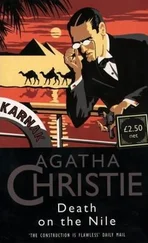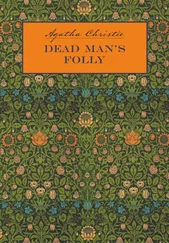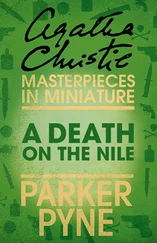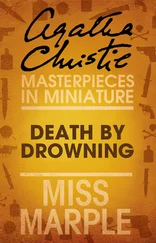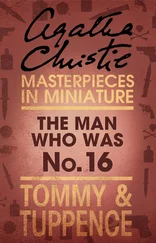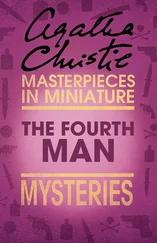Agatha Christie - Dead Man's Folly
Здесь есть возможность читать онлайн «Agatha Christie - Dead Man's Folly» весь текст электронной книги совершенно бесплатно (целиком полную версию без сокращений). В некоторых случаях можно слушать аудио, скачать через торрент в формате fb2 и присутствует краткое содержание. Жанр: Классический детектив, на английском языке. Описание произведения, (предисловие) а так же отзывы посетителей доступны на портале библиотеки ЛибКат.
- Название:Dead Man's Folly
- Автор:
- Жанр:
- Год:неизвестен
- ISBN:нет данных
- Рейтинг книги:5 / 5. Голосов: 1
-
Избранное:Добавить в избранное
- Отзывы:
-
Ваша оценка:
- 100
- 1
- 2
- 3
- 4
- 5
Dead Man's Folly: краткое содержание, описание и аннотация
Предлагаем к чтению аннотацию, описание, краткое содержание или предисловие (зависит от того, что написал сам автор книги «Dead Man's Folly»). Если вы не нашли необходимую информацию о книге — напишите в комментариях, мы постараемся отыскать её.
Dead Man's Folly — читать онлайн бесплатно полную книгу (весь текст) целиком
Ниже представлен текст книги, разбитый по страницам. Система сохранения места последней прочитанной страницы, позволяет с удобством читать онлайн бесплатно книгу «Dead Man's Folly», без необходимости каждый раз заново искать на чём Вы остановились. Поставьте закладку, и сможете в любой момент перейти на страницу, на которой закончили чтение.
Интервал:
Закладка:
"Hardly – not at that period."
"That's what Mr Weyman says – he says the house was built about 1790 or thereabouts. No reason for priests to hide themselves by that date. All the same, you know, there might be – somewhere, some alteration in the structure – something that one of the family might know about. What do you think, M. Poirot?"
"It is possible, yes," said Poirot. "Mais oui, decidedly it is an idea. If one accepts the possibility, then the next thing is – who would know about it? Anyone staying in the house might know, I suppose?"
"Yes. Of course it would let out De Sousa." The inspector looked dissatisfied. De Sousa was still his preferred suspect. "As you say, anyone who lived in the house, such as a servant or one of the family, might know about it. Someone just staying in the house would be less likely. People who only came in from outside, like the Legges, less likely still."
"The person who would certainly know about such a thing, and who could tell you if you asked her, would be Mrs Folliat," said Poirot.
Mrs Folliat, he thought, knew all there was to know about Nasse House. Mrs Folliat knew a great deal… Mrs Folliat had known straight away that Hattie Stubbs was dead. Mrs Folliat knew, before Marlene and Hattie Stubbs died, that it was a very wicked world and that there were very wicked people in it. Mrs Folliat, thought Poirot vexedly, was the key to the whole business. But Mrs Folliat, he reflected, was a key that would not easily turn in the lock.
"I've interviewed the lady several times," said the inspector. "Very nice, very pleasant she's been about everything, and seems very distressed that she can't suggest anything helpful."
Can't or won't? thought Poirot. Bland was perhaps thinking the same.
"There's a type of lady," he said, "that you can't force. You can't frighten them, or persuade them, or diddle them."
No, Poirot thought, you couldn't force or persuade or diddle Mrs Folliat.
The inspector had finished his tea, and sighed and gone, and Poirot had got out his jigsaw puzzle to alleviate his mounting exasperation. For he was exasperated. Both exasperated and humiliated. Mrs Oliver had summoned him, Hercule Poirot, to elucidate a mystery. She had felt that there was something wrong, and there had been something wrong. And she had looked confidently to Hercule Poirot, first to prevent it – and he had not prevented it – and, secondly, to discover the killer, and he had not discovered the killer. He was in a fog, in the type of fog where there is from time to time baffling gleams of light. Every now and then, or so it seemed to him, he had had one of those glimpses. And each time he had failed to penetrate farther. He had failed to assess the value of what he seemed, for one brief moment, to have seen.
Poirot got up, crossed to the other side of the hearth, rearranged the second square chair so that it was at a definite geometric angle, and sat down in it. He had passed from the jigsaw of painted wood and cardboard to the jigsaw of a murder problem. He took a notebook from his pocket and wrote in small neat characters:
"Etienne De Sousa, Amanda Brewis, Alec Legge, Sally Legge, Michael Weyman."
It was physically impossible for Sir George or Jim Warburton to have killed Marlene Tucker. Since it was not physically impossible for Mrs Oliver to have done so, he added her name after a brief space. He also added the name of Mrs Masterton since he did not remember of his own knowledge having seen Mrs Masterton constantly on the lawn between four o'clock and quarter to five. He added the name of Henden, the butler; more, perhaps, because a sinister butler had figured in Mrs Oliver's Murder Hunt than because he had really any suspicions of the dark-haired artist with the gong stick. He also put down "Boy in turtle shirt" with a query mark after it. Then he smiled, shook his head, took a pin from the lapel of his jacket, shut his eyes and stabbed with it. It was as good a way as any other, he thought.
He was justifiably annoyed when the pin proved to have transfixed the last entry.
"I am an imbecile," said Hercule Poirot. "What has a boy in a turtle shirt to do with this?"
But he also realised he must have had some reason for including this enigmatic character in his list. He recalled again the day he had sat in the Folly, and the surprise on the boy's face at seeing him there. Not a very pleasant face, despite the youthful good looks. An arrogant ruthless face. The young man had come there for some purpose. He had come to meet someone, and it followed that that someone was a person whom he could not meet, or did not wish to meet, in the ordinary way. It was a meeting, in fact, to which attention must not be called. A guilty meeting. Something to do with the murder?
Poirot pursued his reflections. A boy who was staying at the Youth Hostel – that is to say, a boy who would be in that neighbourhood for two nights at most. Had he come there casually? One of the many young students visiting Britain? Or had he come there for a special purpose, to meet some special person? There could have been what seemed a casual encounter on the day of the fête – possibly there had been.
I know a good deal, said Hercule Poirot to himself. I have in my hands many, many pieces of this jigsaw. I have an idea of the kind of crime this was – but it must be that I am not looking at it the right way.
He turned a page of his notebook, and wrote: Did Lady Stubbs ask Miss Brewis to take tea to Marlene? If not, why does Miss Brewis say that she did?
He considered the point. Miss Brewis might quite easily herself have thought of taking cake and a fruit drink to the girl. But if so why did she not simply say so? Why lie about Lady Stubbs having asked her to do so? Could this be because Miss Brewis went to the boathouse and found Marlene dead? Unless Miss Brewis was herself guilty of the murder, that seemed very unlikely. She was not a nervous woman nor an imaginative one. If she had found the girl dead, she would surely at once have given the alarm?
He stared for some time at the two questions he had written. He could not help feeling that somewhere in those words there was some vital pointer to the truth that had escaped him. After four or five minutes of thought he wrote down something more.
Etienne De Sousa declares that he wrote to his cousin three weeks before his arrival at Nasse House. Is that statement true or false?
Poirot felt almost certain that it was false. He recalled the scene at the breakfast table. There seemed no earthly reason why Sir George or Lady Stubbs should pretend to a surprise and, in the latter's case, a dismay, which they did not feel. He could see no purpose to be accomplished by it. Granting, however, that Etienne De Sousa had lied, why did he lie? To give the impression that his visit had been announced and welcomed? It might be so, but it seemed a very doubtful reason. There was certainly no evidence that such a letter had ever been written or received. Was it an attempt on De Sousa's part to establish his bona fides – to make his visit appear natural and even expected? Certainly Sir George had received him amicably enough, although he did not know him.
Poirot paused, his thoughts coming to a stop. Sir George did not know De Sousa. His wife, who did know him, had not seen him. Was there perhaps something there? Could it be possible that the Etienne De Sousa who had arrived that day at the fête was not the real Etienne De Sousa? He went over the idea in his mind, but again he could see no point to it. What had De Sousa to gain by coming and representing himself as De Sousa if he was not De Sousa? In any case De Sousa did not derive any benefit from Hattie's death. Hattie, as the police had ascertained, had no money of her own except that which was allowed her by her husband.
Читать дальшеИнтервал:
Закладка:
Похожие книги на «Dead Man's Folly»
Представляем Вашему вниманию похожие книги на «Dead Man's Folly» списком для выбора. Мы отобрали схожую по названию и смыслу литературу в надежде предоставить читателям больше вариантов отыскать новые, интересные, ещё непрочитанные произведения.
Обсуждение, отзывы о книге «Dead Man's Folly» и просто собственные мнения читателей. Оставьте ваши комментарии, напишите, что Вы думаете о произведении, его смысле или главных героях. Укажите что конкретно понравилось, а что нет, и почему Вы так считаете.


